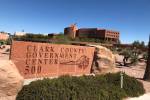The new normal for Southern Nevada: high unemployment for a while
So this is what Southern Nevada's new normal looks like: Persistently high unemployment for at least five more years, and a worse economy than in Buffalo, N.Y.
That's according to a new report from the Brookings Institution, a Washington, D.C., think tank that measured education and job trends from 2007 to 2011 in the nation's 100 biggest metropolitan areas.
Las Vegas landed at No. 84, ahead of Phoenix, Los Angeles and Detroit, but behind Rust Belt cities such as Akron, Ohio, and Grand Rapids, Mich. Chalk up the city's problems to its concentration in tourism and construction, which couldn't survive steep declines in consumer spending and housing values, Brookings said.
"Las Vegas does have some things going for it," said Jonathan Rothwell, a senior research analyst with Brookings. "It's a great export economy in the tourism sector. But that is a cyclical industry that proved highly vulnerable during this recession, and it hasn't really rebounded. Right now, Las Vegas is hugely dependent on U.S. economic growth, and it will probably continue to struggle until the U.S. economy rebounds."
The report wasn't all bad.
Las Vegas has an above-average match between educational attainment and its jobs base. About 46 percent of local workers have a high school diploma or less, while about 45 percent of jobs here require that level of education. Nationally, there's a bigger surplus of unskilled workers for low-skilled jobs.
Economic vitality isn't just about the balance between education and jobs, though. Economies with higher concentrations of bachelor's degrees hold up better in recessions, Rothwell said.
To escape Brookings' bottom tier, Las Vegas must diversify its economy, building employment in health care, professional services and green energy.
Las Vegas also needs to boost education levels.
Both will take time.
"Maybe 10 years from now, if you're talking about a different Las Vegas where the percentage of workers in tourism isn't quite as high, the city will be in better shape when there's a downturn," Rothwell said.
But a local economist said it shouldn't take a decade for Las Vegas to reverse its fortunes.
Steve Brown, director of the Center for Business and Economic Research at the University of Nevada, Las Vegas, said several factors will improve the local economy within two to three years.
Brown agrees that better-educated cities tend to be more economically stable, and that educated people held their jobs better in the downturn.
But he said it's a stretch to say Las Vegas will suffer from above-average joblessness for years to come. A substantial chunk of the city's unemployed worked in construction and are highly mobile. They'll move on as soon as economic activity picks up noticeably nationwide, Brown said. With far fewer jobless construction workers, expect the unemployment rate to dip.
What's more, said Brown, economic diversification has its downsides.
According to preliminary findings from UNLV research, diversified economies have considerably slower growth rates than less-diverse communities.
"We're not very diversified, but we've had very high growth rates as a result of not being diversified," Brown said.
And when recession clips the wings of high-flying economies, diversification happens naturally, improving dismal prospects. Consider clean energy, cited in the Brookings report as a path to economic expansion. Southern Nevada now has some of the world's largest solar-photovoltaic plants -- projects made possible by the present oversupply of construction workers.
Las Vegas has also boosted its health-care sector, another field that got the Brookings nod. Health care is practically the only local segment that's grown nonstop during the downturn.
Recent developments include the Cleveland Clinic, which came to Las Vegas in 2009 to work with the Lou Ruvo Center for Brain Health, and a partnership announced Wednesday between Stanford Hospital and Clinics and the St. Rose Dominican Hospitals' Center for Neurosurgery.
Should the city try harder for even more diversification? Not necessarily, Brown said. The city is what it is.
"As an economist, I tend to think that markets choose what the place is going to be like, and policy can only kind of handicap the markets in determining what a place is like," he said. "I don't really think the county or state governments can do much to promote diversification. But they shouldn't be in the way of it, either."
Besides, "broad-brush" reports like the Brookings analysis miss details that make a place unique, Brown said.
"The thing that's crazy about it is, we're going to look bad until we look good," he said. "We've done work on determinants of regional growth in the past, and one of the things we find is if we look at different periods of time, the characteristics of states that do well tend to be different from time to time. I have some concern that (Brookings) is saying, 'This is what the winners look like right now, and that's what it's going to look like 10 years from now.' In some sense, it's like watching the weatherman tell you what the weather was like yesterday."
Contact reporter Jennifer Robison at jrobison@reviewjournal.com or 702-380-4512.
OVERALL RANK ON EDUCATION GAP AND INDUSTRY MIXTOP 10 METROPOLITAN AREAS
1. Washington
2. Boston
2. Madison, Wis.
4. Albany, N.Y.
5. Honolulu
6. Poughkeepsie, N.Y.
7. San Francisco
8. Portland, Maine
9. Colorado Springs, Colo.
10. Bridgeport, Conn.
84. Las Vegas
BOTTOM 10 METROPOLITAN AREAS
91. Detroit
91. Los Angeles
93. Phoenix
94. Houston
95. Lakeland, Fla.
96. Dallas
97. Youngstown, Ohio
98. Chattanooga, Tenn.
99. Greensboro, N.C.
100. Riverside, Calif.























